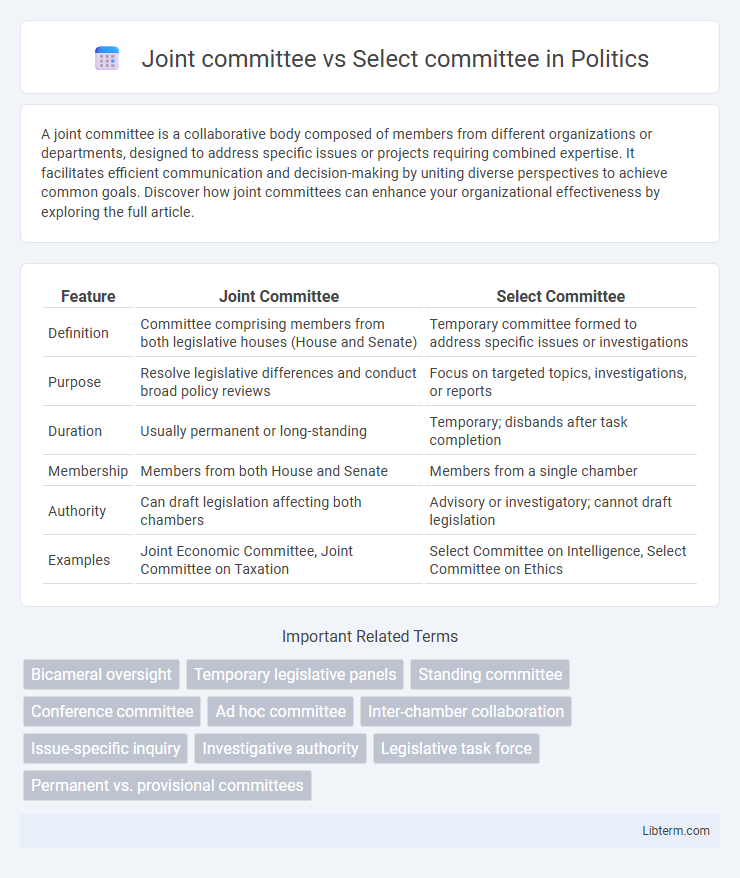A joint committee is a collaborative body composed of members from different organizations or departments, designed to address specific issues or projects requiring combined expertise. It facilitates efficient communication and decision-making by uniting diverse perspectives to achieve common goals. Discover how joint committees can enhance your organizational effectiveness by exploring the full article.
Table of Comparison
| Feature | Joint Committee | Select Committee |
|---|---|---|
| Definition | Committee comprising members from both legislative houses (House and Senate) | Temporary committee formed to address specific issues or investigations |
| Purpose | Resolve legislative differences and conduct broad policy reviews | Focus on targeted topics, investigations, or reports |
| Duration | Usually permanent or long-standing | Temporary; disbands after task completion |
| Membership | Members from both House and Senate | Members from a single chamber |
| Authority | Can draft legislation affecting both chambers | Advisory or investigatory; cannot draft legislation |
| Examples | Joint Economic Committee, Joint Committee on Taxation | Select Committee on Intelligence, Select Committee on Ethics |
Introduction to Congressional Committees
Joint committees consist of members from both the House of Representatives and the Senate, tasked with addressing common concerns like taxation and the Library of Congress. Select committees are temporary panels established for specific investigations or issues, such as the Select Committee on the Climate Crisis. Congressional committees streamline legislative work by specializing in distinct policy areas, facilitating detailed analysis and oversight.
Definition of Joint Committee
A Joint Committee is a legislative committee composed of members from both the House of Representatives and the Senate, created to address specific issues that require coordination between both chambers. Joint Committees perform tasks such as conducting studies, overseeing government operations, or managing shared responsibilities, without reporting legislation. Unlike Select Committees, which are temporary and focus on particular investigations or topics in one chamber, Joint Committees facilitate collaboration across both legislative bodies to streamline processes and information exchange.
Definition of Select Committee
A Select Committee is a temporary legislative body established to investigate or consider specific issues not covered by standing committees, often disbanded after completing its task. Unlike Joint Committees, which consist of members from both legislative chambers, Select Committees typically belong to one chamber and have specialized functions such as oversight or inquiry. Select Committees are integral in addressing urgent or complex matters requiring focused examination beyond the scope of permanent committees.
Formation and Membership Comparison
A Joint Committee is formed by members from both the House of Representatives and the Senate, allowing collaboration across chambers for addressing common issues or administrative tasks. A Select Committee consists of members from only one chamber, either the House or Senate, appointed to investigate or consider specific matters not covered by standing committees. Membership in Joint Committees is smaller and includes representatives from both houses, whereas Select Committees have specialized members solely from one legislative body.
Purpose and Functions
Joint committees consist of members from both legislative chambers, primarily established to handle ongoing issues and facilitate coordination, such as overseeing government departments or reviewing budget allocations. Select committees are temporarily formed to investigate specific problems or events, often producing detailed reports and recommendations for legislative action. While joint committees focus on continuous legislative collaboration and monitoring, select committees emphasize focused inquiry and problem-solving within a defined timeframe.
Duration and Permanence
Joint committees are typically permanent bodies established to address ongoing issues across both legislative chambers, providing continuous oversight and coordination. Select committees are generally temporary, created for a specific purpose or investigation, and dissolve once their tasks are completed. The fixed duration of select committees contrasts with the enduring nature of joint committees, reflecting their differing roles in legislative processes.
Reporting and Legislative Authority
Joint committees typically have limited legislative authority and primarily focus on reporting findings to both chambers of Congress, facilitating coordination between the House and Senate. Select committees often possess broader legislative authority within a single chamber, enabling them to conduct investigations and draft specific legislation tailored to their focused mandate. Reporting from select committees is usually directed to their respective chamber, influencing policy decisions and legislative outcomes more directly compared to joint committees.
Key Examples of Each Committee
The Joint Committee on Taxation is a prime example of a joint committee, comprising members from both the House and Senate to provide unified tax policy analysis. In contrast, the House Select Committee on the January 6 Attack was established as a select committee with a specific investigative mandate limited to events surrounding the Capitol riot. Joint committees typically address ongoing issues affecting both chambers, while select committees focus on specialized, time-sensitive investigations or topics.
Advantages and Limitations
Joint committees enhance legislative efficiency by combining members from both houses, facilitating comprehensive review and coordination of bills, while select committees provide specialized expertise and focused scrutiny on specific issues. Joint committees may face challenges in power dynamics and slower decision-making due to cross-house negotiations, whereas select committees can lack authority outside their narrow mandate and may be limited in influencing broader legislative agendas. Both committee types play crucial roles in balancing detailed oversight with collaborative lawmaking, optimizing parliamentary functions.
Conclusion: Joint Committee vs Select Committee
Joint committees consist of members from both legislative chambers to address broad, ongoing issues and typically have advisory roles, while select committees are temporary, formed to investigate specific issues or conduct detailed studies. Joint committees enhance coordination between chambers but lack the authority to propose legislation, whereas select committees have the power to influence legislation through focused inquiry and reporting. Understanding their distinct functions is essential for effective legislative strategy and governance.
Joint committee Infographic

 libterm.com
libterm.com